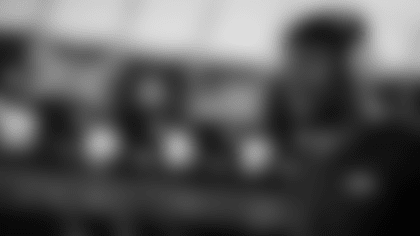Head Coach John Harbaugh
Opening statement:"Alright, good to see you guys – appreciate you being here. Obviously, [it was] a disappointing loss – disappointing to lose these close games the way we are losing them. Bottom line is we're not good enough to win them right now. We're not doing the things we need to do to win them – offense, defense or special teams – in the end, and we have to get those things fixed. We're determined to do it – coaches, players, everybody. We have what it takes. We just have to get better, and we're going to find a way to do it. We're going to find a way to do it with our coaches. We are going to find a way to do it with our players. We're going to do it with scheme. We're going to do it with technique. We're going to do it with details. We're going to find a way to get it done, and we are going to improve. That's what we have to do, and that's really all we can do, and we will get it done."
**Obviously you're going to see a lot of film this week of the Cardinals' secondary, which is playing at a very high level. Obviously, the receivers and tight ends are going to see that film, too, to know what to do against it. Can you show that film to your secondary, too, to just at least show a secondary that is playing at a high level and working together? *(Joe Platania) *"No, we wouldn't do that. Our guys will watch what we have to watch. We'll study ourselves. We play two different defenses."
**What about the Cardinals' secondary as a whole? *(Joe Platania) *"They're playing really well. I like them. They're playing three corners. [Tyrann] Mathieu is playing strong safety; he's a corner-type guy. They mix coverages. They play some man-free when they rush five. They play a version of Cover 6, where they're making calls, and they're matching different formations with different principles – combination coverages. They're playing Cover 3, where they match it man versus certain routes and zone versus other routes. They play another version of 3 where they spot-drop it. We've watched them very carefully. They do a good job. They're a very good defense, very active defense. They play very hard. Their front is very high-motor, and they're playing really good football."
**John, you've applauded the effort of your team. Do you think it's possible that they're, maybe, trying too hard to get it done? I look at QB Joe Flacco's two interceptions where he was really trying to make something happen. Do you see that happening around the team? *(David Ginsberg) *"No, I don't see that. I don't really know what that would mean. You try as hard as you can to do things the right way. To the specific question, it would probably be good to ask [Joe Flacco] if he feels that way. But I know he's working really hard to be as good as he can be, just like all the guys are."
*Coach, have you had a chance to look over the film in terms of some of the clock management issues that went on yesterday and why they keep continuing? *(Jerry Coleman) *"Which ones specifically?" (Reporter: "OK, I have a couple: The timeout on the second play in the second half?") "We had a bad play. You label them as 'clock management issues.' Those are football management issues. When you use a timeout early, you don't have it late. You want to have the timeout. But those are football management issues. When you have a play up that's going to be a disaster for certain reasons that are football-related reasons, you have to use a timeout. Every team in the league has to do that, and we had to do that on that play. The other one, was it a challenge?" *(Reporter: "Yes, a challenge.") "I took a shot there, because it was a big play. You couldn't get it on the screen. We really didn't have it on TV [in the booth]. I took a shot there, because it was a big play in the game. And if we could've won it … We thought we had a chance to win it, and we were hoping we could get it. We had nothing definitive, because we didn't get much on TV, and we got nothing on the screen. But I felt like it was worth taking a shot there, especially with what the score was, and they were going to move it into a two-score game. So again, not a clock management issue."
* *
**The lack of urgency from the offense at the end of the game? *(Jerry Coleman) *"That to me is … No. They're getting up there as fast as they can. We're calling plays. There are two different urgencies that we're using in the fourth quarter. The one before two-minute is one that we're using to get to use the whole array of our playbook, so it takes longer to call those plays. Later in the game, we're getting up there as fast as we can. We try to get plays called as fast as we can under the circumstances. We'll do the best we can in those situations. We'll try to improve, but we want to get up there as fast as we can and call those plays."
Going back to the timeout really quickly though, was there consideration, maybe, [about] just taking the delay of game penalty instead? (Jerry Coleman) "No, we wanted to get a good play off there. There's not always a … A timeout is not always the most important thing, especially when you're behind. Sometimes we want to keep drives alive. [When] you start backing yourself up with penalties … I think you'd be asking me that question. You'd be asking me, 'Hey, why are we getting so many penalties? Why'd we take a delay of game penalty that put you behind the curve on first down?' Sometimes you decide to take a delay, maybe. Sometimes you take a timeout if you think that's the best thing to do."
John, as a follow up, you say that you're concerned with the coaching staff, the details. If you watch the last minute of the football game, [CBS analyst] Rich Gannon – who's an ex-NFL MVP – he was adamant that the club didn't show the sense of urgency it needed. (Stan Charles)"We were trying to get to the line as fast as we could and get the plays called as we could. Could it have been done faster? Sure. We want to do it as fast as we possibly can. It's not like we're not trying to do that." (Reporter: "Nobody is saying that anybody's not trying.") "We just have to execute it better. It goes back to what you're saying. We're going to try to execute everything as well as we can – as best as we can – in every kind of circumstance. That's what we coach our guys to do. We work two-minute [drills] twice a week every single week. Do we have to be better? Absolutely, we have to be better at it. We want to be quicker at it. We want to get plays called quicker. There are ways to do that. We don't have to change formations in those situations, and that's what we have to do. It's something that we'll definitely go to work on. I'm not making excuses for it. I'm just telling you we are trying to go as fast as we can, and it's something we have to improve on."
John, do you have an update on S Kendrick Lewis with the MRI with his knee? (Luke Jones) "No, I haven't talked to [head certified athletic trainer] Mark [Smith], yet. I don't have any updates on injuries, I apologize. I have been grinding away on tape. I haven't had a chance to get to that, yet."
John, there was a pass to FB Bruce Miller, the fullback, where he was very wide open. Not trying to single anybody out, but was that a coverage mistake that left him wide open, or was that just on you guys? (Cliff Brown)"That was on us, as far as we didn't have that covered like we needed to. That was a good scheme by them against a heavy run defense that set a route up that confused a combination coverage there. The other two … We had four big plays against their [offense] that really counted for most all of their offense, and the other ones were poor technique, as far as coverage technique. That was a scheme issue. The other three were poor technique."
You had a long history with QB Carson Palmer with the Bengals. What have you seen from him this year? (Todd Karpovich) "I've watched a couple games now of their offense. I would say [Carson Palmer is] throwing accurately. He's making throws under pressure. He's doing a good job. He looks good. He has good receivers, and they're doing a good job."
**John, you and the players have talked generally about needing to fix things, but when you look at the film, specifically, what are the top few things you'd like to fix, and how do you plan to go at it? *(Childs Walker) *"That's for us. We'll work on that list as we go. I'll talk to the players about that. We'll meet on that on Tuesday and prioritize those things as we go. That's what we'll work on. The big-picture things on defense? We have to quit giving up big plays. If we stop giving up big plays, we're playing very good defense. But that's how it always works when you give up big plays. That's where all the yards are at. That's how most of the yards are made in this league – by big plays. It's hard to methodically go down the field every single series and execute perfectly. There's no margin for error with that, so you have to be able to make big plays. If you can stop big plays, then you're going to stop an offense. Now, within that, there are a lot of details that go into that. There are personnel issues. There are scheme issues. There are matchup issues. Those are all the things that we have to look at specifically. I can't get into all that, but the big-picture thing for the defense is the big plays. Offensively, we need to start making some big plays. We need to scheme some big plays in. We need to attack some weaknesses in coverages a little bit better, and we need to make some of those plays. We need to make some catches, need to make some throws, need to make some runs, some run blocks. And we have to do a better job of finding those things for our guys, as well as a coaching staff. Turnovers – when you're minus in your turnover territory – when you have more turnovers than your opponents, it's going to be a tough time winning. We have to clean that up. Those are the big-picture things."
When it comes to QB Joe Flacco and the turnovers and the interceptions, are you seeing a regression, because he seems to be throwing more than he has in the past of late? (Jerry Coleman) "Yes, I think that's an obvious thing, as far as throwing more than [Joe Flacco] has. We'll find a way. But to use that term [regression] … I would never use that term. I don't think it's for a guy of his career. He has had more than he's going to want to throw. He's going to tell you that. He's going to be the guy that's going to be the first one to look at that and see that that's a part of it, and we have to go to work on that."
John, amid some of the gloomy stuff that we're talking about, was it a reassuring bit of news that you guys were able to sign G Marshal Yanda to an extension on Friday? (Childs Walker)"It was great to sign Marshal [Yanda]. [He is] a very deserving player. He speaks to what we believe we're all about as an organization, and it's good to get a guy like that back. We'd like to do more of that with guys who are here and proven themselves. We want to keep all those guys as long as we can. To get that done is a really big plus for us."
John, the neighborhood you're in right now at 1-5, fortunately you've never been there before. Is there anything positive that you can take out of going through the situation looking ahead? (Stan Charles) "I've listed those things many times every single week in here, and those things will always stand. Those are timeless things. Those are things that go toward becoming the football team that we're going to be. We know what kind of a team we're going to be. We have a vision for what it looks like. We haven't been able to get there, yet. We think we're going to get there every week. We work hard to get there every week. Our guys are relentlessly hard workers, as are our coaches. We practice, we prepare, we plan, and we haven't seen the fruits of our labor, yet. And we haven't made ourselves good enough to do that, yet. We have to get that done. We will get it done. Time is something … We can't say when. We're planning on doing it this week. We believe we'll get it done this week. We believed we'd get it done last week and the week before that. That's just the way life is. Everybody knows that. We're all alive. We know how challenges are when you face adversity, and there will be some forging – all those things that go with that – but we're not going to back down. We're not going to get frustrated. We're not going to get disappointed. We're not going to point fingers. We're not going to buy into some of the things and some of the terms that want to get thrown out about us. We'll just live with it. We'll stand tall, and we'll keep fighting. That's what we'll do."
John, did you guys consider any kind of formal complaint to the league about the field conditions that maybe led to K Justin Tucker's missed kick? (Childs Walker)"No."
Coach, might you bring in some secondary guys to work out this week in light of what transpired? (Jerry Coleman)"We might. Yes."
Did you feel like you were a little harsh on CB Shareece Wright yesterday, only being around for just four days? (Jerry Coleman)"No." *(Reporter: "No?") *"We coach guys the way you need to. Shareece [Wright] and I have a great relationship, and I've known him for about a year now. And he understands. There are certain things that are expected. You play above the line; you play below the line. He played above the line for all but two plays – he played very well. Those two plays are plays that you've got to play correctly. So no, you coach the way you think you need to in whatever environment or situation you need to."
At 1-5, motivation has to be a little bit hard to come by right now for this team. What do you do as a head coach to kind of get all 53 guys [motivated] and get their heads back in the game? (Matt Stevens)"They'll be motivated. We're a motivated group. We have a bunch of guys that understand how to work hard and how to deal with adversity. So no, it's not hard to come by at all – not at all."
John, I know you touched on it a little bit on the completion to FB Bruce Miller, but last week you had said when you and defensive coordinator Dean Pees looked at the defensive calls, I think it was three out of 90 that you would have done differently. How would you assess the overall calls yesterday? (Luke Jones)"I didn't have any problem with any of the calls yesterday, but there are always calls that you're going to look at and you're going to say, 'Hey, we could be better.' You're going to always try to find things that you could do better. There were no major issues with that yesterday."
John, you guys have lost eight straight when QB Joe Flacco has had to throw 40 times or more. Is that a media stat, or does that speak to how important it is to have balance and that you guys had to throw a little more than you wanted yesterday because of the score or didn't run it well enough? (Cliff Brown)"You just said it. It's indicative of the way the game goes. You can keep running until the end of the game when you're behind, but you can't move the ball enough when you just run the ball when you're behind to win the game. So, usually that's an indication of being behind in the second half. That's the biggest indicator of run-pass balance, is what the score is in the second half, and you try to stay with the run as long as you can. But, you have to throw the ball to move the ball and score points. And you have to run the ball as well, because if you don't, you become one dimensional. So, we have to run the ball for more than 3.5 [yards] a carry. We don't want to be sitting there with second-and-11 and second-and-12 on a regular basis. But we popped some runs, too; we had some good runs. We need to be balanced. We need to do well at both, and usually, if you get the lead, keep the lead, extend the lead, you'll have a lot of runs at the end of the day."
* *
John, you've said you will never give into exhaustion or despair no matter what the record is, but is that something you need to talk to the players about at all in this situation? Do you feel the need to lift them at all? (Childs Walker)"You do that every day as a coach. That's what you do. That's part of the job; it's a big part of the job, and that's really important. [When you] talk to them, you weigh your words carefully after the game in the locker room. What we say to them tomorrow is going to be really important. The tone that you set, the environment that you create is very important, and we'll do that. It'd be nice not to go through adversity. It'd be nice to never have tough things happen in life or in football. It'd be nice to go through every season here and be on top. It'd be great to do that. We strive to do that. We want it to be that way, but we don't always get that. So, you better be able to face the hard times, too, and be able to pull yourself up and find a way to overcome. All the questions are about, 'Are you going to be able to do that? Can you do that?' I don't even really know how to take it. It's like, 'Of course we can! Of course we will!' What do you do in your life? You'd do the same thing. So, we'll do the same thing in our life, in our professional life. We'll fight, man. We will *fight. *We'll come out swinging, and we'll find a way to win. And we will turn it around. There's no doubt about it. It's going to happen, no matter how much some people doubt, even some people in this room."
John, you have a background as a secondary coach – you're final year in Philadelphia. Has that prompted you to want to get a little more hands on with that group, because that is … (Luke Jones)"I'm hands on with every group. I'm hands on with every group. Yes, I'm always hands on with the secondary. They know that. I'm pretty involved with those guys. I'm in a lot of their meetings and things like that, but you also have to allow your coaches to coach and do their job. That's part of the balancing act of a head coach. As you go through it over the years, you learn how to work that. You try to pick your spots, you push where you need to push, you ask tough questions where you need to ask tough questions, you motive, you encourage where you need to encourage, and you do everything you can, everything you can think of, everything you can find. Every scheme – every idea that you can glean – you come up with it and you put it out there and you try to improve your football team everywhere you can. And that part of it, the secondary, is part of it as well."

















